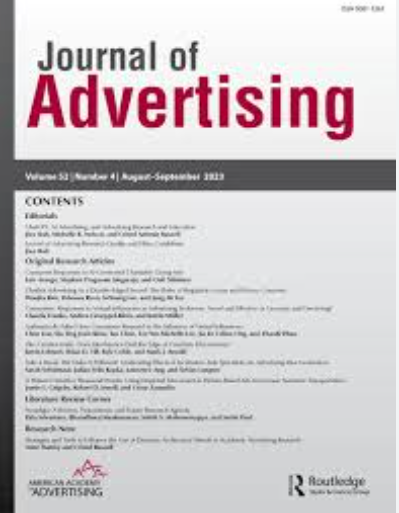广告研究中数据质量的驱动因素:MTurk和专业面板样本的差异
IF 5.4
2区 管理学
Q1 BUSINESS
引用次数: 13
摘要
众包已经成为广告和社会科学研究人员首选的数据收集方法,因为这些样本避免了与专业面板数据相关的较高成本。然而,人们对在线资源的数据质量一直存在担忧。本研究考察了五种流行的在线数据源(包括专业面板和众包平台)在广告实验中数据质量的差异。研究了影响数据质量的潜在机制的影响,包括响应满意度、多任务处理和工作。正如所提出的,一个串行中介模型表明数据源直接或间接地与这些数据质量的先决条件相关。满意度与多任务处理呈正相关,与努力负相关,这两个中介(并行)延伸到数据质量,表明通过这些中介变量对数据质量的间接影响是显著的。一般来说,经过审查的MTurk样本(即CloudResearch批准的)比其他四个来源产生更高质量的数据。无论数据来源如何,研究人员都应该利用保障措施来确保数据质量。提供了从在线样本中获取高质量数据的保障措施和其他策略。本文章由计算机程序翻译,如有差异,请以英文原文为准。
Drivers of Data Quality in Advertising Research: Differences across MTurk and Professional Panel Samples
Abstract Crowdsourcing has emerged as a preferred data collection methodology for advertising and social science researchers because these samples avoid the higher costs associated with professional panel data. Yet, there are ongoing concerns about data quality for online sources. This research examines differences in data quality for an advertising experiment across five popular online data sources, including professional panels and crowdsourced platforms. Effects of underlying mechanisms impacting data quality, including response satisficing, multitasking, and effort, are examined. As proposed, a serial mediation model shows that data source is, directly and indirectly, related to these antecedents of data quality. Satisficing is positively related to multitasking and negatively related to effort, and both mediators (in parallel) extend to data quality, indicating that the indirect effects on data quality through these mediating variables are significant. In general, a vetted MTurk sample (i.e., CloudResearch Approved) produces higher quality data than the other four sources. Regardless of the data source, researchers should utilize safeguards to ensure data quality. Safeguards and other strategies to obtain high-quality data from online samples are offered.
求助全文
通过发布文献求助,成功后即可免费获取论文全文。
去求助
来源期刊

Journal of Advertising
Multiple-
CiteScore
11.20
自引率
10.50%
发文量
55
期刊介绍:
The Journal of Advertising is the premier journal devoted to the development of advertising theory and its relationship to practice. The major purpose of the Journal is to provide a public forum where ideas about advertising can be expressed. Research dealing with the economic, political, social, and environmental aspects of advertising, and methodological advances in advertising research represent some of the key foci of the Journal. Other topics of interest recently covered by the Journal include the assessment of advertising effectiveness, advertising ethics, and global issues surrounding advertising.
 求助内容:
求助内容: 应助结果提醒方式:
应助结果提醒方式:


